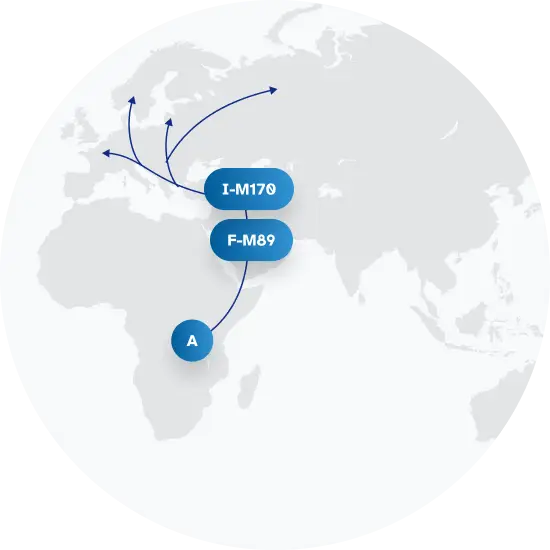Explore the Family Name Farmer
How common is the last name Farmer in the United States?
Based on the Decennial U.S. Census data, the surname Farmer had seen a slight shift in popularity between 2000 and 2010. In the year 2000, Farmer was ranked as the 431st most popular surname, but by 2010 it dropped to the 480th position, marking an 11.37 percent decrease in ranking. However, the total count of individuals with this last name saw a modest rise of 1.91 percent over the same period, from 68,309 to 69,617. Even though there was an increase in the actual number of individuals bearing the surname, the proportion per 100,000 people fell by 6.79 percent, from 25.32 to 23.6.
| 2000 | 2010 | Change | |
|---|---|---|---|
| Rank | #431 | #480 | -11.37% |
| Count | 68,309 | 69,617 | 1.91% |
| Proportion per 100k | 25.32 | 23.6 | -6.79% |
Race and Ethnicity of people with the last name Farmer
When it comes to ethnic identity, the Decennial U.S. Census data reveals interesting changes for those carrying the Farmer surname between 2000 and 2010. The percentage of Farmers identifying as Asian/Pacific Islander increased by 38.24 percent, and those identifying as having two or more races rose by 28.17 percent. There was also an increase among Hispanics (53.33 percent) and Blacks (3.38 percent). Meanwhile, the percentage of individuals with the Farmer surname identifying as White decreased slightly by 2.34 percent, and those identifying as American Indian and Alaskan Native increased moderately by 6.06 percent.
| 2000 | 2010 | Change | |
|---|---|---|---|
| White | 79.01% | 77.16% | -2.34% |
| Black | 16.88% | 17.45% | 3.38% |
| Hispanic | 1.35% | 2.07% | 53.33% |
| Two or More Races | 1.42% | 1.82% | 28.17% |
| American Indian and Alaskan Native | 0.99% | 1.05% | 6.06% |
| Asian/Pacific Islander | 0.34% | 0.47% | 38.24% |
Farmer ancestry composition
23andMe computes an ancestry breakdown for each customer. People may have ancestry from just one population or they may have ancestry from several populations. The most commonly-observed ancestry found in people with the surname Farmer is British & Irish, which comprises 57.7% of all ancestry found in people with the surname. The next two most common ancestries are French & German (22.1%) and Scandinavian (3.5%). Additional ancestries include Eastern European, Nigerian, Spanish & Portuguese, Italian, and Ghanaian, Liberian & Sierra Leonean.
Ready to learn more about your ancestry? Get the most comprehensive ancestry breakdown on the market by taking our DNA test. Shop 23andMe
| ANCESTRY BREAKDOWN | COMPOSITION |
|---|---|
| British & Irish | 57.7% |
| French & German | 22.1% |
| Scandinavian | 3.5% |
| Other | 16.8% |

Possible origins of the surname Farmer
Your DNA provides clues about where your recent ancestors may have lived. Having many distant relatives in the same location suggests that you may all share common ancestry there. Locations with many distant relatives can also be places where people have migrated recently, such as large cities. If a large number of individuals who share your surname have distant relatives in a specific area, it could indicate a connection between your surname and that location, stemming from either recent ancestral ties or migration.
Based on 23andMe data, people with last name Farmer have recent ancestry locations all within the United Kingdom of Great Britain and Northern Ireland.
| RECENT ANCESTRY Location | Percentage |
|---|---|
| Greater London, United Kingdom | 88.80% |
| Glasgow City, United Kingdom | 88.80% |
| Merseyside, United Kingdom | 88.60% |
| Greater Manchester, United Kingdom | 88.60% |
| West Midlands, United Kingdom | 88.50% |
What Farmer haplogroups can tell you
Haplogroups are genetic population groups that share a common ancestor on either your paternal or maternal line. These paternal and maternal haplogroups shed light on your genetic ancestry and help tell the story of your family.
The top paternal haplogroup of people with the surname Farmer is I-FGC15106, which is predominantly found among people with European ancestry. Haplogroup I-FGC15106 is descended from haplogroup I-M170. Other common haplogroups include R-Z159 and R-CTS241, which are predominantly found among people with European and European ancestry. Other surnames with similar common haplogroups are: Cooke, Taylor, Blake, Green, Smith, White, Young, Mitchell, Stephens, Brown.
The most common maternal haplogroups of people with Farmer surname are: H1, T2b, H. These most commonly trace back to individuals of European ancestry.
 Paternal Haplogroup Origins I-M170
Paternal Haplogroup Origins I-M170Your maternal lineage may be linked to Marie Antoinette
Because it is so dominant in the general European population, haplogroup H also appears quite frequently in the continent's royal houses. Marie Antoinette, an Austrian Hapsburg who married into the French royal family, inherited the haplogroup from her maternal ancestors. So did Prince Philip, Duke of Edinburgh, whose recorded genealogy traces his female line to Bavaria. Scientists also discovered that famed 16th century astronomer Nicolaus Copernicus traced his maternal lineages to haplogroup H.

What do people with the surname Farmer have in common?
Spoiler alert: it's complicated. People with the same last name are usually no more genetically similar than a randomly sampled group of people from the same population. That said, people with the same surname are more likely to have similar ancestries than randomly sampled individuals. The reason is the tendency of people with similar cultural or geographical backgrounds to preferentially mate with one another. That's why people who share a surname may be more likely to share traits and tendencies in common than people within the general population. Check out the percentages below to see the prevalences of tastes, habits, and traits of people with your surname compared with prevalences among 23andMe users.
Preferences
Traits
Habits
Wellness
Are health conditions linked to the last name Farmer?
The short answer is that, if there is an association between surname and health, it's usually more about your ancestry than your name. Individuals with a given surname are no more genetically similar than the general population but often have similar ancestries. The populations of people associated with those shared ancestries often have sets of genetic variations, also known as alleles, in common. Some of those alleles are associated with a greater likelihood of developing certain diseases.
Disease variant frequency by ancestry
Disease allele frequencies in populations associated with the surname Farmer are shown below. Important Note: not everyone with a disease allele will develop these health condition


























